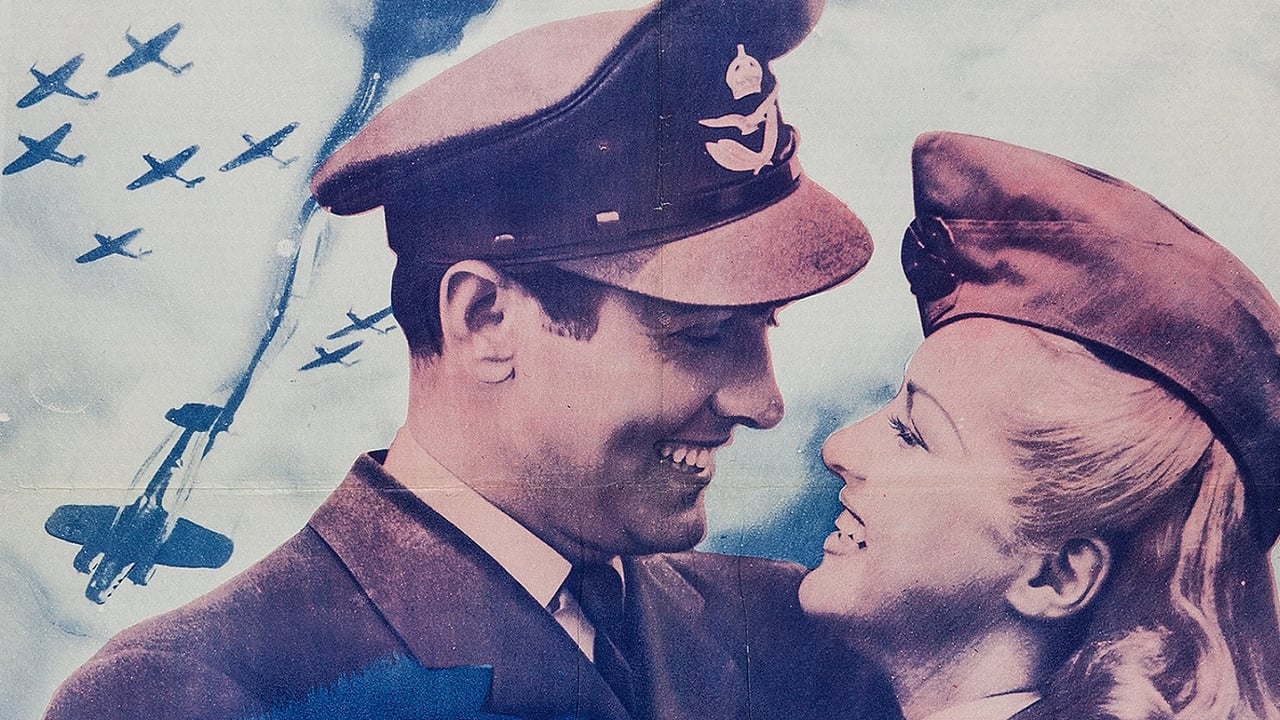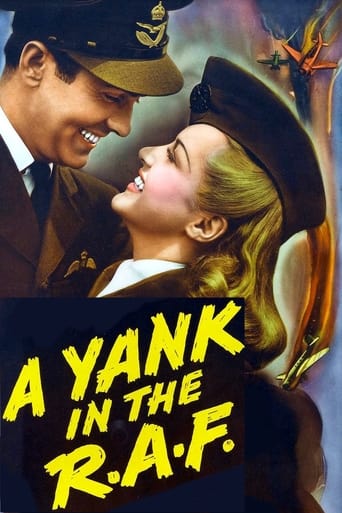

This is surprisingly good for being such a flimsy entertainment - to start with. Betty Grable sings two songs at a nightclub, and in the video available to me those two performances were muted - those songs can't have been much to listen to anyway, since all that counts when she is on stage is her legs. That's the first thing you see of her in the film, and whenever you see her again all you want to see is her legs. Tyrone Power is equally dandy, a roguish playboy getting off to Canada when he is supposed to land in New Jersey, wandering in which direction England lies...But this happy-go-lucky business gradually gets serious, as the war starts and stranded pilots suddenly find themselves surrounded by Germans in Holland - the air fights are the real treat of the film, and there are even some casualties. The change from show business to realism is what makes the film worth seeing, and although both Tyrone Power and Betty Grable are at their best, the English actors are just as good. It's both a great entertainment, an interesting war film from the beginning of the war, actually introducing it to an American audience, and with a proper finale in the guns and smokes and fires at Dunkirk. Tyrone Power even gets properly bandaged in the end.
... View MoreA Yank in the R.A.F. (1941)This is pretty thin going stuff, and yet it's fun and warm-hearted and tinged with the drama of the times.Context is everything here. 1941. The war is raging in Europe and Britain is being bombed by the Germans and they are trying to build up their forces to resist what seems to be an unstoppable foe. The U.S. is not yet in the war (that would happen in six months, but the movie makers couldn't know that for sure). All the U.S. is doing is supplying their future allies, Canada and Great Britain.But in the air here at home (I write this from New York) was a sense of inevitability--we would eventually be drawn in to fight. This movie is part of the gearing up for that fact.The lead is an American paradigm, Tyrone Power playing a cocky, charming, good-natured, and well-meaning young man who happens to be a pilot. What happens to him is what was happening to the country as a whole. And it boils down to this: he starts with innocence and selfishness and gets involved in stages, helping sell planes, helping fly planes, then actually doing battle runs over enemy territory.That gives nothing away--it's the title of the movie.What pulls him along? First just making some money. But then he meets an old flame played by Betty Grable (the number one pin-up girl for U.S. soldiers once they get involved) and Grable represents the U.S., too, because she's already in Britain helping the cause. Love ensues, but the problem is a handsome British soldier who begins to steal Grable's heart. A love triangle.And because this is practically al propaganda film (not officially of course) you know that it will leave the audience (us) with the proper message of about doing the right thing and supporting the cause against the Nazi regime. There is even the shocking if not surprising current event built into the movie of the Germans vowing not to invade certain lowland countries and then, of course, invading them anyway.Is this a great movie? Not by any means. But it's very well paced and the characters are warm and well-drawn, at least for such a "tale" as this. I wouldn't watch it a second time, but I'm glad I did this first one. And if you are the least bit interested in how Hollywood primed America for the war this slight film (along with "Casablanca" and many other movies) is a must-see.And for those who care, the airplane scenes were done with the really R.A.F. (and a different film crew than the rest of it). The director (except for those scenes) is Henry King, who got his pilot's license in 1918, and who lived so long that in his last years he was the oldest active pilot in the U.S. I'm sure he gave some authenticity to the film at least in spirit.
... View MoreWhen I first read the reviews for A Yank in the R.A.F., I thought, come on, it can't be THAT bad! As a pilot myself, who is eternally enamored of historical aviation related movies, I went into this viewing experience thinking, Tyrone Power - the R.A.F. - it's got to be, at least, an O.K. flick. I was wrong.Some viewers complained about the aviation scenes as weak points (and some of the special effects simulations were weak - even by 1941 standards). I found the few minutes of actual footage of Spitfires, however, being refueled, rearmed and taking off in mass formations to be the only high point of the film. One scene of a Spitfire being brought in for refueling, with the wingtips being tended by the ground crew, as it spins around very quickly to line up with the refueling truck is especially awesome. The crewman on the wingtip on the outside of the turn looks like a rag doll as the Spit does a very fast 180 degree turn. This scene was from candid footage, clearly in full combat mode, and would never be seen today.Cinematography and character development are both effective. The problem is that once the characters are developed one realizes that it's impossible to care about (or even respect) either of the two American leads. Power's character, a combination of sophomoric imbecile/great heroic pilot (a combination I would challenge anyone to find in real life), was too much a distraction to be entertaining. Even WWII wasn't enough to straighten him out.There seemed to be hope for Grable's character. For a time one imagined that by movie's end she would be able to make a good decision and live in splendor in a beautiful country estate with a titled English gentleman for the rest of her life. But even that was a disappointment.
... View MoreI don't know why, but I always find myself enjoying this. It sounds like a typical war movie but it's mainly the story of a love triangle involving the cocky young pilot Tyrone Power, the sober but smitten Squadron Leader John Sutton, and the scrumptious Betty Grable. There are a few action scenes, well done for the period, but they provide background material. The focus is on the on-again off-again relationship between Power and Grable.One of the reasons it's so likable is that there are no villains except the Germans. Reginald Gardiner provides some comic relief as a pilot who is dying to meet chorine Grable but whose attempts to do so are always frustrated. Gardiner's self sacrifice is one of a few events that bring Tyrone Power to his senses and cause him to take both the war and his responsibilities to others seriously.Power himself was rarely more handsome or dashing. Over at Warners', Erroll Flynn was handling similar parts. Betty Grable has never looked better, more Midwestern, more cream fed, more succulent, more lustrously blond, more plump lipped and nubile. She was THE pin up girl of World War II. In her most famous photograph, she wears a modest one-piece white bathing suit, hands on hips, back to the camera, smiling at the camera over her right shoulder. Today the photo is an historical curiosity, but in its day the censors felt compelled to airbrush even the hint of her gluteal sulcus into nonexistence. Her legs were insured for a million dollars, according to legend, and those were days when a million dollars was still a lot of moolah.I always feel a little sorry for John Sutton, Powers' boss. He's respectful, polite, manly, brave -- and he loses the girl he loves because Tyrone Power was a bigger Hollywood star. Used to happen to me in high school all the time. I was a better kid than the coarse and vulgar captain of the football team, and I still can't understand why Evelyn Ritzko was more interested in him. However, Sutton, good man that he is, takes his ultimate rejection in stride.God, those Spitfires were beautiful airplanes, with their broad elliptical wings, and they were a pleasure to fly. Pilots used to other fighters complained that you couldn't GET them to drop their noses and dive. They simply floated along like a child's paper airplane.
... View More